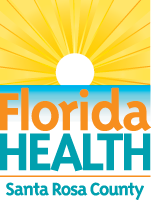It's a New Day in Public Health.
The Florida Department of Health works to protect, promote, and improve the health of all people in Florida through integrated state, county, and community efforts.
Smokeless Tobacco is Getting the Boot
June 28, 2016
Milton, Fla. – As major league baseball teams are prohibiting the use of tobacco, the Florida Department of Health in Santa Rosa County and the Florida Department of Health’s Bureau of Tobacco Free Florida are raising awareness about the dangers of smokeless tobacco, like chew and dip, during this summer’s Knock Tobacco out of the Park campaign. This public awareness campaign was created to reduce the use of smokeless tobacco among athletes to help combat this deadly addiction. Tobacco Free Florida aims to help combat this deadly addiction, especially within baseball.
Although youth cigarette smoking rates in Florida are at an all-time low, 6.8% percent of high school students in Santa Rosa reported current use of smokeless tobacco products in 2014 according to the Florida Youth Tobacco Survey.
Professional baseball players, who have traditionally had high levels of smokeless tobacco use, serve as role models for impressionable youth.[i] Since the 2012 season, professional baseball players have been prohibited from carrying tobacco tins in their uniforms and using smokeless tobacco during televised interviews, at autograph signings and other events where they meet fans, or at team-sponsored appearances.[ii] However, these restrictions did not eliminate smokeless tobacco use on the field or in the dugout.
The Yankee Stadium and Citi Field joins San Francisco, Boston, Los Angeles and Chicago in enacting tobacco-free measures. According to Campaign for Tobacco-Free Kids, a statewide law in California will take effect before the 2017 season. Once all these laws are implemented, one-third of major league stadiums will be tobacco-free, and other MLB cities are considering similar measures.
“Smokeless tobacco products contain harmful chemicals that are known to cause cancer,” said Shannon Hughes, Director of the Florida Department of Health’s Community Health Promotion. "Youth often view athletes as role models and therefore, are likely to mimic their behavior, including tobacco use.” [iii],[iv]
At least 28 cancer-causing chemicals have been identified in smokeless tobacco.[v] Smokeless tobacco users have an 80 percent higher risk of oral cancer and a 60 percent higher risk of esophageal cancer and pancreatic cancer compared to non-users.[vi]
Currently, there is no scientific or medical evidence that proves smokeless tobacco use is an effective method to help people quit smoking. Floridians who want to quit any form of tobacco have access to the state’s free and proven-effective resources.
- CALL: Call Tobacco Free Florida at 1-877-U-CAN-NOW to speak with a Quit Coach® who will help you assess your addiction and help you create a personalized quit plan.
- CLICK: Tobacco Free Florida’s online cessation tool can be accessed at tobaccofreeflorida.com/webcoach.
- COME IN: In person help is available with the help of Area Health Education Centers by calling 850-398-6965.
For more information, please visit www.tobaccofreeflorida.com.
About Tobacco Free Florida
The department’s Tobacco Free Florida campaign is a statewide cessation and prevention campaign funded by Florida’s tobacco settlement fund. Tobacco users interested in quitting are encouraged to use one of the state’s three ways to quit. Since 2007, more than 126,140 Floridians have successfully quit, using one of these free services. To learn more about Tobacco Free Florida and the state’s free quit resources, visit www.tobaccofreeflorida.com or follow the campaign on Facebook at www.facebook.com/TobaccoFreeFlorida or on Twitter at www.twitter.com/tobaccofreefla.
The department works to protect, promote and improve the health of all people in Florida through integrated state, county and community efforts. Follow us on Twitter at @HealthyFla and on Facebook. For more information about the Florida Department of Health please visit www.floridahealth.gov.
[i] "Smokeless Tobacco: Impact on the Health of Our Nation's Youth and Use in Major League Baseball." Centers for Disease Control and Prevention. Centers for Disease Control and Prevention, 01 June 2010. Web. 2016
[ii] "Tobacco Limits in Major League Baseball Contract a Victory for Players and Kids' Health." Knock Tobacco Out of the Park. N.p., n.d. Web. 2016.
[iii] U.S. Department of Health and Human Services. The Health Consequences of Smoking—50 Years of Progress: A Report of the Surgeon General. Atlanta: U.S. Department of Health and Human Services, Centers for Disease Control and Prevention, National Center for Chronic Disease Prevention and Health Promotion, Office on Smoking and Health, 2014 [accessed 2014 Oct 31].
[iv] World Health Organization. IARC Monographs on the Evaluation of Carcinogenic Risks to Humans. Volume 89: Smokeless Tobacco and Some Tobacco-Specific N-Nitrosamines.[PDF–3.18 MB] Lyon (France): World Health Organization, International Agency for Research on Cancer, 2007 [accessed 2014 Oct 31].
[v] World Health Organization. Smokeless Tobacco and Some Tobacco-Specific N-Nitrosamines International Agency for Research on Cancer Monographs on the Evaluation of Carcinogenic Risks to Humans Vol. 89. Lyon, (France): World Health Organization, International Agency for Research on Cancer, 2007 [accessed 2015 Feb 10].
[vi] Boffetta, P, et al., “Smokeless tobacco and cancer,” The Lancet 9:667-675, 2008.





Connect with DOH